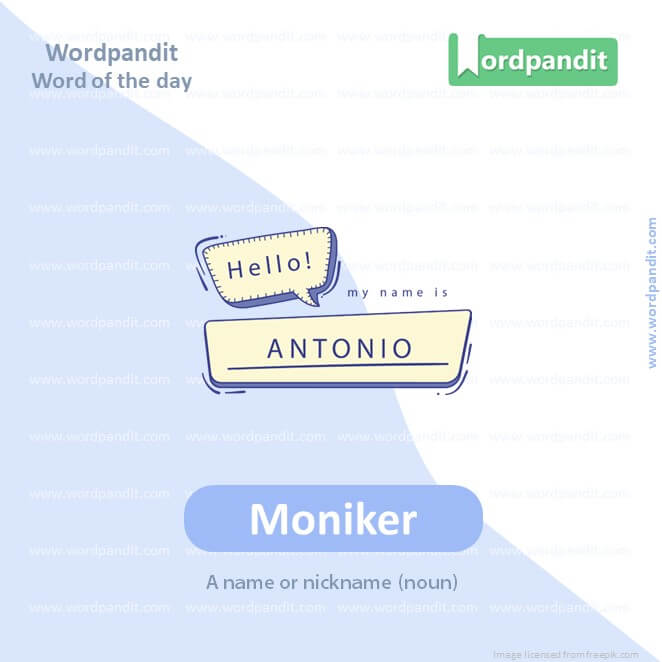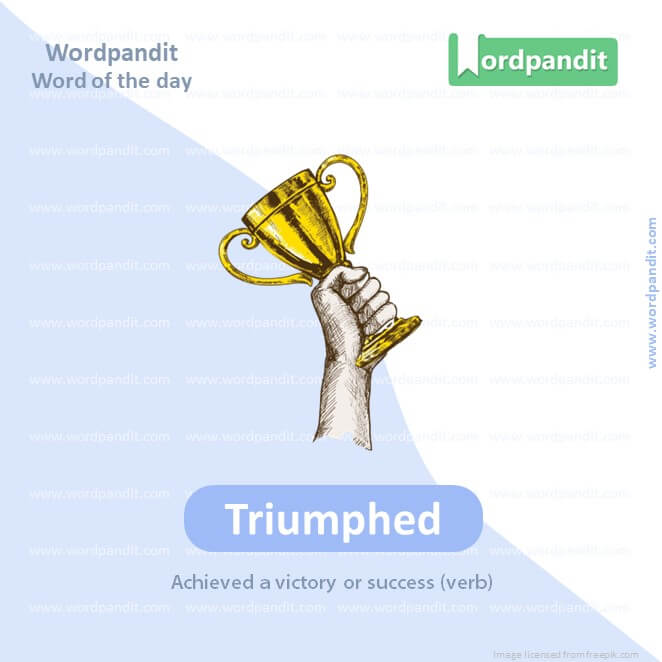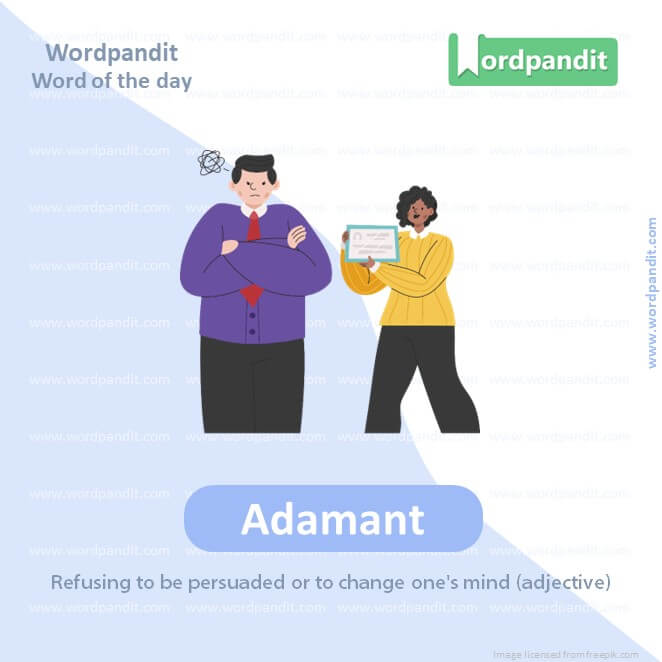Daily Vocabulary Words: Enhance Your Lexicon with Leading Newspapers & Publications
Welcome to the Daily Vocabulary section at Wordpandit!
Our mission is straightforward: to bring you essential vocabulary words featured in top newspapers and publications worldwide. By focusing on words you’ll encounter in renowned sources, we aim to help you enhance your vocabulary effectively and practically.
Our selection includes words from:
– The New York Times
– The Washington Post
– Scientific American
– BBC
– The Guardian
– Psychology Today
– Wall Street Journal
– The Economist
– The Hindu
– The Times of India
– The Economic Times
– Hindustan Times
– Live Mint
– The Indian Express
– And many more.
We are committed to your vocabulary development. Simply visit this section regularly and explore the daily posts. This is your go-to repository for commonly used words, providing significant practical benefits by familiarizing you with vocabulary from the leading publications listed above.
Make it a habit to visit our website daily and expand your lexicon with words from top newspapers and publications.
WORD 1: Debilitating
CONTEXT: Some get the message that their brain is broken and that they can never trust their thoughts and perceptions. Many, like Luca, are put on antipsychotic drugs with debilitating side-effects.
SOURCE: Aeon
EXPLANATORY PARAGRAPH: Think about when you feel really tired and don’t want to play anymore because you don’t have the energy. When something makes you feel this way, it’s called “debilitating.” It’s like when your toys are all spread out, and you feel too tired to put them back because they seem too heavy all of a sudden.
MEANING: Making someone very weak and unable to function properly (adjective).
PRONUNCIATION: dee-BIL-ih-tay-ting
SYNONYMS: draining, weakening, exhausting, enervating, sapping
USAGE EXAMPLE:
1. The flu was so debilitating that she couldn’t get out of bed for a week.
2. After running the marathon, he felt completely debilitating and rested for the entire next day.
3. Debilitating pain in his knee kept him from playing his favorite sport.
4. The heat was so debilitating that everyone stayed indoors to avoid it.
WORD 2: Resurrected
CONTEXT: Mr. Satheesan said Mr. Anvar had resurrected the spectre of gold smuggling that plagued the first Pinarayi Vijayan government.
SOURCE: The Hindu
EXPLANATORY PARAGRAPH: Imagine your favorite toy breaks and you fix it so you can play again. That’s a bit like “resurrected.” It means to bring something back or make it start again after it was gone or stopped.
MEANING: Brought back to use, attention, or life (verb).
PRONUNCIATION: reh-SUH-rekt-ed
SYNONYMS: revived, restored, renewed, reinvigorated, rejuvenated
USAGE EXAMPLE:
1. The festival was resurrected after a ten-year hiatus.
2. The author resurrected the character in her new book.
3. The old traditions were resurrected by the community.
4. They resurrected the proposal for further discussion.
WORD 3: Accusations
CONTEXT: He said Left Democratic Front (LDF) Independent legislator P.V. Anvar had recently “validated” the Congress’ accusations against the CMO.
SOURCE: The Hindu
EXPLANATORY PARAGRAPH: If someone says you took a cookie when you didn’t, they’re making an “accusation.” It’s when someone says you did something wrong, even if you didn’t do it.
MEANING: Claims that someone has done something wrong or illegal (noun).
PRONUNCIATION: ak-yoo-ZAY-shuns
SYNONYMS: charges, allegations, claims, assertions, indictments
USAGE EXAMPLE:
1. The accusations against him were found to be false.
2. She faced accusations of cheating during the test.
3. Accusations flew during the heated debate.
4. He denied all the accusations put forward by his opponent.

WORD 4: Stigmatising
CONTEXT: The answer wasn’t always to give people stigmatising labels and pummel their brains with antipsychotic drugs.
SOURCE: Aeon
EXPLANATORY PARAGRAPH: If someone is made to feel very embarrassed or ashamed about something that makes them different, like needing glasses to see better, that’s called “stigmatising.” It’s like telling someone they’re weird because they wear glasses, which can make them feel sad.
MEANING: Treating someone or something as if they are not normal or are shameful (verb).
PRONUNCIATION: STIG-muh-ty-zing
SYNONYMS: disgrace, brand, label, mark, condemn
USAGE EXAMPLE:
1. Stigmatising mental health issues can prevent people from seeking the help they need.
2. The film was criticized for stigmatising people living in poverty.
3. He was stigmatised by his peers for his failure at the competition.
4. Stigmatising certain diseases can lead to discrimination.

WORD 5: Moniker
CONTEXT: In worse times, I’d visit him in St Elizabeth’s, a public asylum with nearly 300 beds on the south side of the Anacostia River, in the neighbourhood that earned the city its moniker as ‘murder capital of the US’.
SOURCE: Aeon
EXPLANATORY PARAGRAPH: A “moniker” is a special name that someone might have, like a nickname. For example, if you are really fast, people might start calling you “Lightning.”
MEANING: A name or nickname (noun).
PRONUNCIATION: MON-i-ker
SYNONYMS: nickname, alias, pseudonym, handle, tag
USAGE EXAMPLE:
1. His friends gave him the moniker “Flash” because he runs so fast.
2. She uses a moniker instead of her real name when she writes her stories.
3. Everyone at the camp knew him by his moniker rather than his real name.
4. The artist chose a catchy moniker to stand out in the music industry.
WORD 6: Disenchanted
CONTEXT: Dopamine began to look like one small piece of a much larger puzzle. Psychiatrists became equally disenchanted with the serotonin theory of depression.
SOURCE: Aeon
EXPLANATORY PARAGRAPH: When you start feeling like something you used to love isn’t as wonderful as you thought, like maybe a toy isn’t as fun as it used to be, that feeling is called being “disenchanted.”
MEANING: Losing belief or enthusiasm for something previously admired (adjective).
PRONUNCIATION: dis-en-CHANT-ed
SYNONYMS: disillusioned, disappointed, dissatisfied, disheartened, dispirited
USAGE EXAMPLE:
1. She became disenchanted with her job after realizing there was no room for promotion.
2. After several failed attempts, he grew disenchanted with his hobby.
3. The voters are disenchanted with all the candidates.
4. She felt disenchanted with the movie that had received so much hype.

WORD 7: Assiduously
CONTEXT: The lowest ever turnout in a democratic British election speaks to the lack of enthusiasm: Greens and independents should assiduously court those who abstained last time.
SOURCE: The Guardian
EXPLANATORY PARAGRAPH: When you work really hard to color inside the lines or build the tallest tower, you’re being “assiduous.” It means doing something with a lot of effort and attention so it turns out great.
MEANING: With great care and perseverance (adverb).
PRONUNCIATION: uh-SIJ-oo-us-lee
SYNONYMS: diligently, carefully, meticulously, thoroughly, industriously
USAGE EXAMPLE:
1. He worked assiduously to complete his project on time.
2. She studied assiduously for her exams.
3. The team worked assiduously to meet their goals.
4. Assiduously, she maintained her garden throughout the summer.

WORD 8: Triumphed
CONTEXT: The independents who triumphed did not exclusively win Muslim votes, but this is clearly their base – the exception, of course, being Corbyn, who is in a category of his own.
SOURCE: The Guardian
EXPLANATORY PARAGRAPH: Think about when you finally finish a big puzzle or win a race at school. That feeling of being super happy because you did it? That’s what “triumphed” means—you won or did really well.
MEANING: Achieved a victory or success (verb).
PRONUNCIATION: TRY-umft
SYNONYMS: prevailed, won, conquered, succeeded, overcame
USAGE EXAMPLE:
1. She triumphed in the spelling bee, taking first place.
2. After many failures, he finally triumphed with his invention.
3. The team triumphed over all odds to win the championship.
4. She triumphed against her fears and spoke confidently in public.
WORD 9: Malign
CONTEXT: Congress leader Rashid Alvi accuses BJP leaders of trying to malign the West Bengal State government led by Chief Minister Mamata Banerjee.
SOURCE: The Hindu
EXPLANATORY PARAGRAPH: When someone says bad things about someone else that aren’t true to make others not like them, that’s called “malign.” It’s like telling someone your friend stole a cookie when they didn’t, just so others think they’re not nice.
MEANING: To speak harmful untruths about someone; evil in nature or effect (verb, adjective).
PRONUNCIATION: muh-LYN
SYNONYMS: slander, defame, vilify, denigrate, besmirch
USAGE EXAMPLE:
1. The article maligned his reputation with false accusations.
2. It’s unfair to malign someone based on rumors.
3. Her speech was full of malign comments about her opponents.
4. He felt that the malign influence of the group was corrupting the community.

WORD 10: Adamant
CONTEXT: Yet the Greens’ left-facing deputy leader, Zack Polanski, is adamant that the party’s leftwing urban voters and its countryside constituency can exist in a single coalition.
SOURCE: The Guardian
EXPLANATORY PARAGRAPH: When you really, really don’t want to stop playing and tell your mom “No, I won’t go to bed!”, you’re being adamant. It means you are very firm and won’t change your mind.
MEANING: Refusing to be persuaded or to change one’s mind (adjective).
PRONUNCIATION: AD-uh-mant
SYNONYMS: unyielding, inflexible, resolute, stubborn, determined
USAGE EXAMPLE:
1. She was adamant that the party be held outdoors.
2. Despite the advice, he remained adamant about not selling the car.
3. The customer was adamant about getting a full refund.
4. He was adamant in his refusal to go along with the plan.













